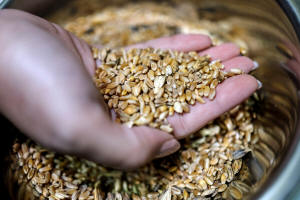COP27: Israel harnessing DNA of bygone wild crops to enhance food supply
 Send a link to a friend
Send a link to a friend
 [November 10, 2022]
By Rinat Harash and Ari Rabinovitch [November 10, 2022]
By Rinat Harash and Ari Rabinovitch
Rishon Lezion, Israel (Reuters) - Could the
key to securing the world's food supply for the future be hidden in the
DNA of crops from the distant past?
Scientists in Israel are creating a gene bank from the seeds of local
wild crops, some that have survived for thousands of years since the
birth of agriculture and that may help farmers deal with a harsher
climate in the coming decades.
In a eucalyptus grove nestled between an industrial zone and a new
railroad under construction, botanist Alon Singer collected seeds from a
number of plants recently spotted, including a variety of water mint,
that will be frozen and stored at the Israel Plant Gene Bank at the
Volcani Institute, the national agricultural R&D center.
Singer is combing the country along with other scouts and foragers in
search of varieties of wheat, barley and countless other wild crops so
their genetic makeup can be saved and studied before they are lost to
expanding deserts and urbanization as the climate warms.
"The plants here are very unique. They are the ancestors of many of the
cultivated plants used today," he said.

Resilient characteristics can be harnessed to genetically modify farmed
crops so they better withstand drought or disease.
Sometimes they don't make it in time and a plant of interest falls
victim to a new road before its next bloom.
Tens of thousands of types of seeds are stored in the gene bank. It may
be smaller than some collections elsewhere in the world but the gene
pool here is unique, coming from an area that was part of the Fertile
Crescent region known as the birthplace of crop cultivation.
[to top of second column]
|

Einav Mayzlish-Gati, Director of the
Israel Plant Gene Bank holds a palmful of seeds at the Volcani
Institute in Rishon LeZion, Israel November 3, 2022. REUTERS/Amir
Cohen

"This is where agriculture started about 10,000 years ago," said
Einav Mayzlish-Gati, director of the gene bank. "Species that were
domesticated here are still in the wild adapting along the years to
the changes in the environment."
The research has already been paying off. For example, the institute
has engineered a variety of wheat with an ultra-short lifecycle. It
may not be able to compete today, but it could be a saving grace in
a hotter climate with reduced growing seasons.
The World Bank warns that global agriculture is extremely vulnerable
to climate change. Negative effects, it said, are already being felt
with hotter temperatures, more frequent extreme weather events, and
invasive crops and pests.
Agriculture and global warming will be discussed by global leaders
in Egypt on Saturday at COP27, the latest edition of the United
Nations annual climate change summit.
For daily comprehensive coverage on COP27 and climate change in your
inbox, sign up for the Reuters Sustainable Switch newsletter here.
(Reporting by Rinat Harash and Ari Rabinovitch; Editing by Frank
Jack Daniel)
[© 2022 Thomson Reuters. All rights
reserved.]
This material may not be published,
broadcast, rewritten or redistributed.
Thompson Reuters is solely responsible for this content. |